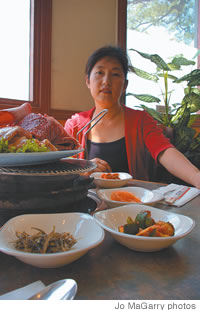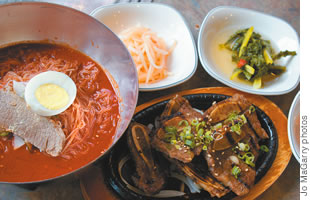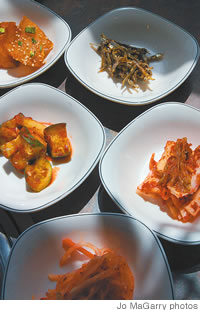The secret to authentic Korean cuisine

Friday - July 11, 2008
|
 Del.icio.us |
Del.icio.us | 
|
I am no expert on Korean food, and I’m the first person to admit it. There wasn’t a lot of bulgogi and mandoo being served in Scotland when I was growing up, although I dare say a bowl of spicy kim chi stew would have been a treat on a freezing winter’s night.
I do, however notice good food, and I’m fairly quick to recognize when a restaurant owner or chef has a passion for what he or she does. The first time I went to Migawon (under this ownership) for lunch, I was impressed immediately by the use of charcoal in the yakiniku grills, the diversity of the menu and the layers of spice in the sauces. I asked the owner, Min Suk Ahn, to explain some of the dishes and her cooking methods but, to be honest, we didn’t get very far. Her Korean accent and my Scottish one weren’t clicking, and it was obvious that she wasn’t giving out any secrets. So I called my New York-born-and-raised Korean friend Anne and invited her to lunch. On our second trip to Migawon, my suspicions were confirmed: The food is excellent and, yes, there are secrets that the kitchen is not revealing - whether you’re fluent in Korean or not.
Min Suk Ahn grew up around good food. Her parents owned a casual restaurant in Korea and served homemade rice, mandoo, soups and other versions of Korean comfort food. When she moved to Hawaii, she worked in local Korean restaurants and finally decided to open her own place, believing that family recipes, traditional sauces and unique presentations would be the way to attract a loyal customer base.

|
“The food here is very authentic,” said Anne, who was raised on her Korean mother’s cooking. “My parents came here the last time they visited and they loved it.”
Neng myun is one of the many specialties. The noodles in this traditional Korean soup are made fresh daily from sweet potato. Served in stainless steel bowls and topped with a boiled egg, the thin, glassy noodles are refreshing and provide an interesting contrast to the chilled soup base, spicy chili sauce and hot beef broth that comes in a mug on the side. Other specialties include pot stews of beef and octopus, seafood or bulgogi; grilled croaker, snapper or mackerel; and a variety of jun dishes that include oyster jun, nok doo jun and fish jun.
Charcoal is used to fire up the restaurant’s yakiniku grills, and there’s little doubt that it adds to the uniqueness of the restaurant.
“We like the way the charcoal adds a lot of flavor to the food,” says Min Suk, “and our customers come for that. It’s one of the things that we offer that no one else does in Hawaii.” The restaurant has state-of-the-art filters installed to ensure a smoke-free environment for diners.
Other popular dishes on the Migawon menu include bulgogi (beef rib eye marinated in traditional soy sauce) and pork bulgogi (pork meat marinated in a hot and spicy sauce) along with stone pot rice, which crisps and browns as it sits in its heated stone container.
Migawon is open 24 hours, and the long hours ensure a diverse customer base. “We have a lot of people who come early morning time when they’ve finished their work,” says Min Suk.

|
The roadwork on Kapiolani Boulevard that has been steadily moving down the main street this past year or more is now taking place directly outside Migawon, making getting there a little more of a challenge than usual. There is however, ample parking at the back of the restaurant (off Kapiolani Boulevard) that is unaffected by construction.
Look for monthly specials that offer signature dishes (like kalbi soup or homemade pancakes) at a reduced price; this month there’s kalbi and neng myun for just $11.95, or $7.95 for the neng myun alone.
Migawon Korean Restaurant
1726 Kapiolani Blvd.
947-5454
Annual Korean Festival.
This weekend you can sample some of Migawon’s “secret” recipe dishes and enjoy a host of other Korean treats at the seventh annual Korean Festival at Kapiolani Park. The festival will include a variety of performances, including taekwando, tea ceremonies and dance along with food booths.
Seventh annual Korean Festival
Saturday, July 12
10 a.m.-9 p.m.
Kapiolani Park and Bandstand.
Admission is free and open to the general public.
Scrip available for purchase.
E-mail this story | Print this page | Comments (0) | Archive | RSS Comments (0) |
Most Recent Comment(s):












